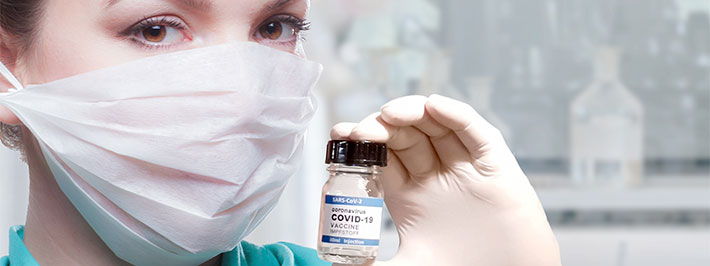
Covid-19: 5 New Reassuring Vaccine Facts
What is the impact of the Covid-19 vaccine on hospitalizations? What are the real side effects of these serums? What do we know about the efficacy of the third dose?
So many questions that people ask themselves that cause concern. As the vaccination campaign progresses, new information is added to our knowledge on the subject. Here are some reassuring facts about the Covid-19 serum.
The coronavirus vaccination campaign began at the beginning of the year in most of the world. Today, millions of people have a complete vaccination schedule.
1. How many deaths has vaccination prevented? This is the question the French asked themselves; Researchers at the University of Montpellier, in collaboration with the University Hospital of Nîmes and Caen, wanted to answer it. To do this, they carried out a study, the results of which are available on the scientific pre-publication site OSF Preprints.
To assess the impact of vaccination on the number of deaths, the researchers compared the actual curve for the number of admissions to critical care and hospital deaths due to Covid-19 since last January, with a projected curve for the number of admissions and deaths that were reported. have registered during the same period if there had been no vaccine, established by means of a mathematical model.
Result: As of August 20, the French vaccination campaign had already prevented 39,100 intensive care stays and 47,400 hospital deaths, the researchers behind this model indicate. "It is serious work and the results are not surprising, but they should be taken as an order of magnitude and not as a precise assessment," said Parisian epidemiologist Mahmoud Zureik, who was not involved in these works.
2. Vaccinated people would be 11 times less likely to be admitted to intensive care
To evaluate the efficacy of anti-Covid-19 vaccines, the Department of Research, Studies and Evaluation of Statistics (DREES) periodically analyzes data related to the vaccination status of people infected, hospitalized and deceased due to Covid -19. In its latest study, published on August 20, it reveals that there are eight times fewer positive screening tests for Covid-19 and eleven times fewer admissions to critical care in vaccinated people than in unvaccinated people.
The study reveals, in particular, that the unvaccinated accounted for 84% of admissions to critical care and 76% of admissions to conventional hospitalization during the first week of August. "Vaccination considerably reduces the risk of hospitalization in intensive care. It is a very important message for all populations that still doubt the importance of vaccination. There is a real protective impact of vaccination with the vaccines that we have in France," he stressed the general director of Health, Jérôme Salomon, on August 20.
3. Covid-19 would be associated with more adverse events than the vaccine
Since the start of the vaccination campaign, the issue of side effects of anti-Covid-19 sera has raised questions. In France, the Pfizer / BioNTech vaccine is the most administered: according to the latest data from the National Agency for the Safety of Medicines and Health Products (ANSM), 44,587 cases of side effects have been recorded since the start of the vaccination campaign.
To take stock of the adverse effects associated with the Pfizer / BioNTech vaccine, the Clalit Research Institute (Israel), in collaboration with researchers from Harvard University (United States), conducted the largest study to date on the subject . The results are available in the New England Journal of Medicine (NEJM).
The researchers divided this work into two parts: First, they compared adverse events that occurred in 884,828 vaccinated and 884,828 unvaccinated people. Of the 25 side effects potentially associated with the vaccine analyzed, they found that only four of them had a strong association with the anti-Covid serum: myocarditis, lymphadenopathy, appendicitis and herpes.
The second part of the study consisted of comparing the adverse effects that occurred in 173,106 vaccinated non-infected with Covid-19 and 173,106 non-vaccinated infected. They found that a Covid-19 infection was associated with a significantly higher risk of some of these same side effects. "These results convincingly show that this mRNA vaccine is very safe and that the alternative to the natural morbidity caused by the coronavirus puts a person at a significant, higher and much more common risk of serious adverse events," concluded the Professor Ran Balicer, lead author of the study and director of the Clalit Research Institute.
4. 90% of the patients in intensive care in AP-HP are not vaccinated
The Paris hospital also released its figures on the vaccination status of hospitalized people. "In our resuscitations for public assistance, in critical care, 90% are unvaccinated, 10% are usually vaccinated with other diseases that explain a serious form," said Martin Hirsch, CEO.
Data confirming the efficacy of anti-Covid-19 sera. "We know that vaccination considerably reduces the risk of death, the risk of dragging very serious complications for several months, saves life," added Martin Hirsch.
5. Covid-19 vaccine: the third dose would be 86% effective in people over 60 years of age
In Israel, the administration of the third dose began in July and the first reassuring data on its effectiveness were released on August 18. These figures were released by the Israeli health insurance organization Maccabi and broadcast by Reuters. Out of more than 800,000 people over the age of 60, 149,144 had received their third dose at least a week ago and 675,630 had only received two doses more than six months ago. In total, 37 of the people who received the vaccine booster tested positive for Covid-19, compared with 1,064 people who received just the two doses. Therefore, the third dose would be 86% effective in those over 60 years of age, according to these initial figures.